InfoPOLAR December 2022
In this edition
- Welcome to CHARS
- POLAR Board of Directors
- Research and funding
- Inuit polar bear experts share their knowledge in a ground-breaking new study
- Using DNA to track invasive species in the Arctic
- How is climate change affecting the Arctic's smallest mammal, the lemming?
- POLAR-GNWT partnership supports the search for solutions to declining caribou herds
- Northern Scientific Training Program Update
- Polar Knowledge Canada Fellowship Program
- Yukon call for proposals
- Canadian, Inuit and UK Research Teams (CINUK Programme)
- 2022 Northern Science Award
- POLAR student awards
- Knowledge mobilization, community engagement
- Aqhaliat report
- POLAR webinar series
- POLAR Speaker series in Cambridge Bay
- "What's in the water?" youth biodiversity workshop
- Avian influenza awareness
- Clean energy for northern communities
- The 2022 Youth Science Career Awareness Camp
- Annual General Meeting of the Kitikmeot Inuit Association
- Visits to CHARS
- Visit from Minister Dan Vandal
- Visit from Prime Minister Justin Trudeau and the NATO Secretary General
- Senate Standing Committee on National Security and Defence
- International events and the Antarctic
This has been an exciting and productive year at Polar Knowledge Canada (POLAR) thanks to you, our partners, and colleagues. As the year draws to a close, we would like to take this opportunity to share just a few highlights from 2022.
At POLAR, our goals remain constant. We are focused on a sustainable approach to Canadian Arctic research based on Indigenous and scientific knowledge. Canadian leadership in polar science and technology means strengthening our relationships and continuing our collaborations with Indigenous partners in establishing processes that include Arctic research priorities and opportunities.
Throughout the year, we have also steadily increased Inuit representation within our workforce through our Inuit Employment Plan, while also advancing the Government of Canada's goal—and ours—to be an employer of choice in Canada's North.
POLAR Board of Directors
Have you met POLAR's board of directors? The board is responsible for the organization's strategic direction. POLAR's last board of directors meeting was hosted at CHARS in June. The Board was able to discuss important matters and meet with partners in the community. While in Cambridge Bay, they also participated in an IQ day (a day spent learning Inuit traditional knowledge), which also coincided with World Ocean Day.
Memorandum of Understanding with Northern Indigenous organizations
POLAR has Memorandums of Understanding with Inuit Tapiriit Kanatami and the Gwich'in Tribal Council. These agreements strengthen POLAR's efforts to advance research that addresses the priorities of Inuit and Gwich'in communities through co-development, capacity building and collaboration. They also ensure that Indigenous leadership and governance are part of POLAR's fabric.
POLAR focuses its efforts on collaborative and interdisciplinary work that is driven by the needs of northern communities and the key questions that are significant to its Canadian and international partners. Learn more about our approach and values in POLAR's Strategic Plan.
Research and funding
Research and funding at POLAR is led by our Science and Technology Program and based on POLAR's three goals:
- Improving knowledge of dynamic northern terrestrial, freshwater and marine ecosystems in the context of rapid change;
- Increasing understanding of the connections between northern community wellness and environmental health; and
- Advancing energy, technology and infrastructure solutions for the unique environmental, social and cultural conditions in the North.
Learn more about our funding and programs.
Inuit polar bear experts share their knowledge in a ground-breaking new study
In a new report, Inuit polar bear experts from the Nunavut communities of Pangnirtung and Kimmirut answer some crucial question about the health and abundance of polar bears. Inuit knowledge is fundamental to understanding how polar bears are faring in the face of climate change. The report will be an essential tool in wildlife management planning for the Davis Strait polar bear population.
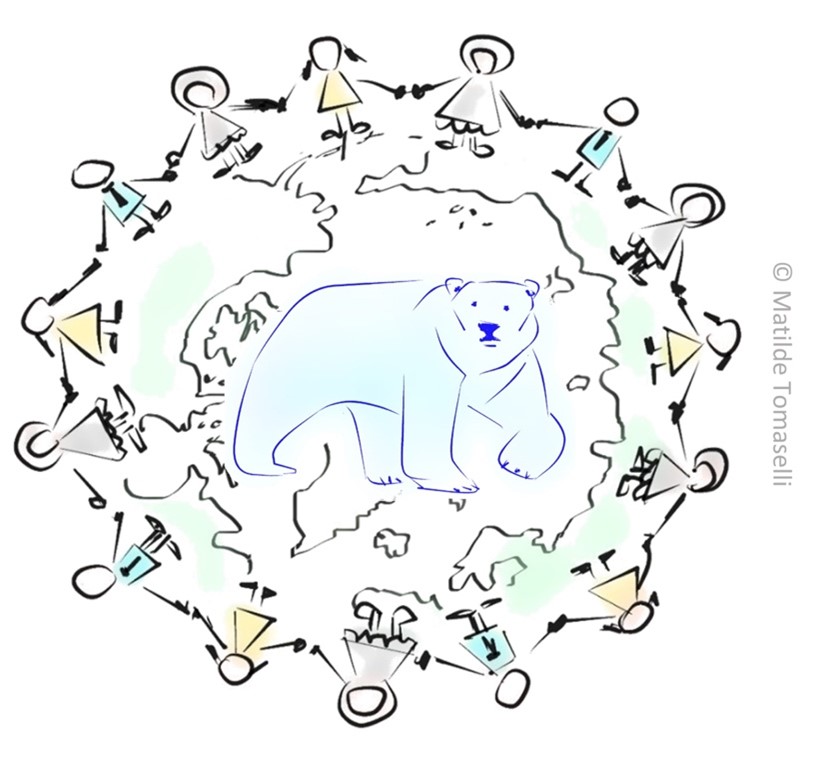
Matilde Tomaselli, POLAR research scientist and project co-lead, created this image to represent the many partners, including Inuit polar bear experts, who worked together on the study.
Using DNA to track invasive species in the Arctic
POLAR researchers are using DNA barcoding to lay the groundwork for detecting invasive species in the future. To spot new animals that climate change may bring north in the future —including tiny invertebrates— we need to know what species are living in the Arctic today. DNA barcoding is a technique that uses genetics to identify an animal's species and the population it is part of.
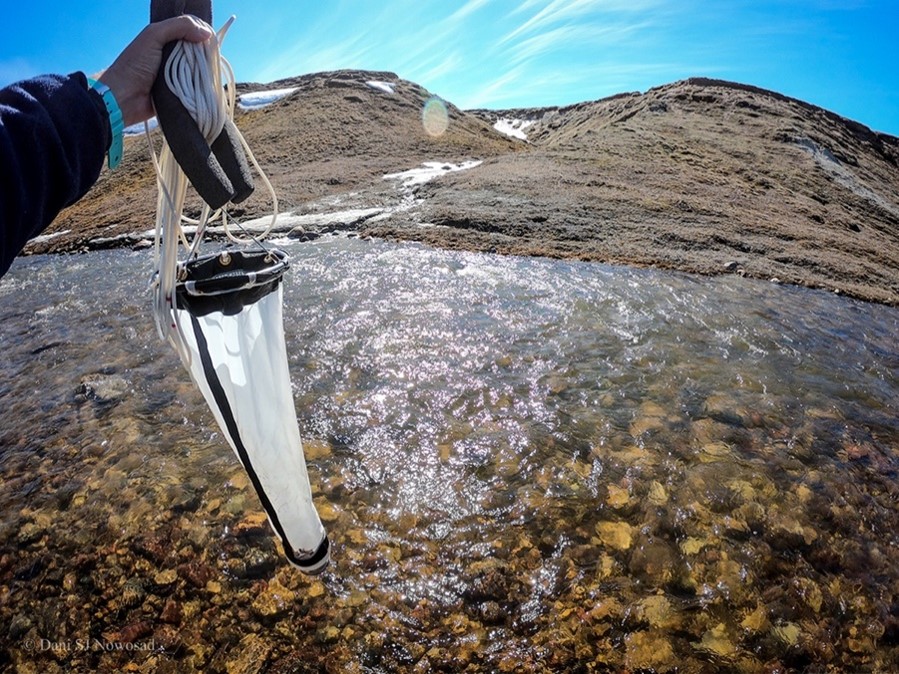
Net used to collect zooplankton samples in a creek near Augustus Hills, about 20 km west of Iqaluktuttiaq/Cambridge Bay, Nunavut.
How is climate change affecting the Arctic's smallest mammal, the lemming?
Scientists from Université Laval, the Canadian Museum of Nature, and Polar Knowledge Canada have been looking at how freezing rain affects lemmings. Lemmings are an essential food for many arctic predators. In winter, they dig tunnels under the snow to stay warm. Climate change is bringing more freezing rain, making the snow harder. The researchers demonstrated that in harder, denser snow, lemmings cannot dig as fast, and make shorter tunnels. That's important, because as the climate warms, rain will fall on snow more often in the Arctic, and lemmings may have to work harder to survive.
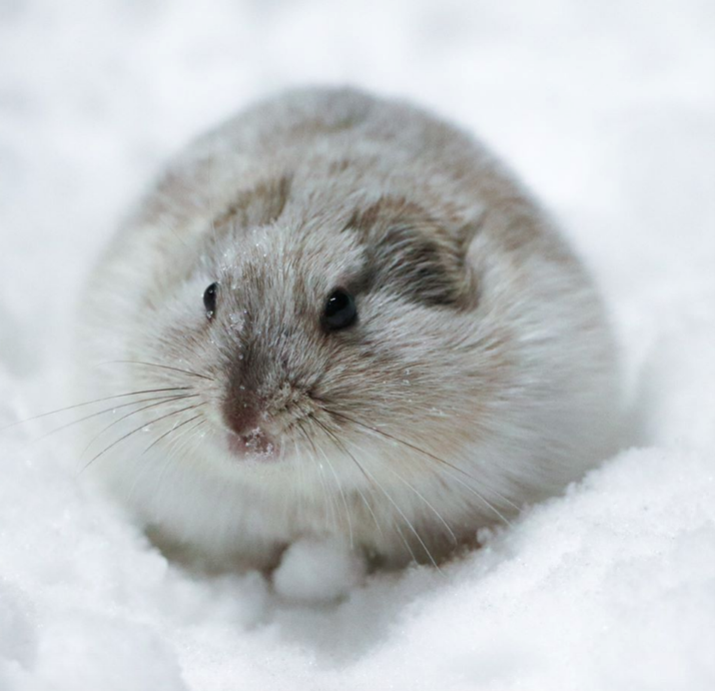
POLAR-GNWT partnership supports the search for solutions to declining caribou herds
Polar Knowledge Canada and the Government of the Northwest Territories are collaborating to offer new funding for caribou research. Approximately $850,000 will be available annually for the next three years for research on barren ground caribou.
Northern Scientific Training Program Update
POLAR administers the Northern Scientific Training Program (NSTP), created in 1961 by the Government of Canada to encourage Canadian universities to train northern specialists to meet national needs. The NSTP provides supplementary funding to graduate students across Canada. This year the program provided a total of $920,000 in grants to 279 students at 36 universities.
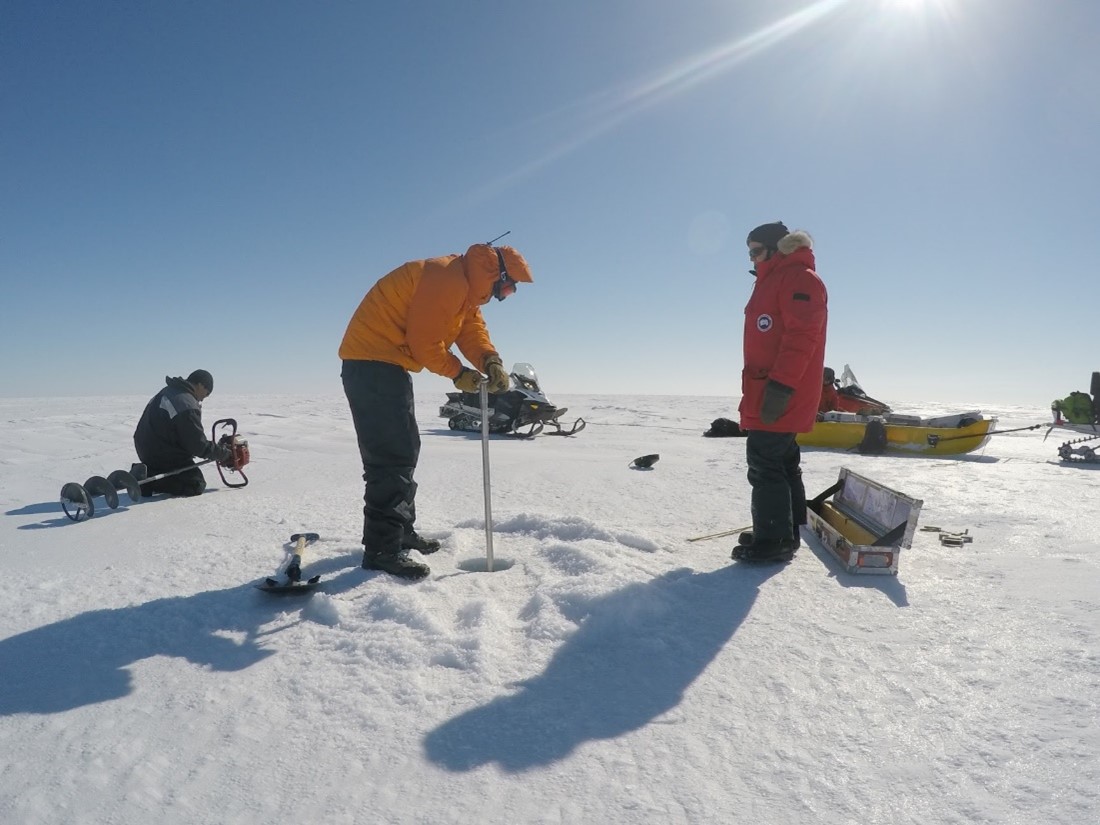
NSTP-supported students taking ice cores in Dease Strait, Nunavut.
Photo: Laura Dalman
Polar Knowledge Canada Fellowship Program
This year Polar Knowledge Canada launched a new fellowship program to help strengthen northern-based research. The Polar Knowledge Canada (POLAR) Fellowship ($50,000) supports post-doctoral and visiting research fellows at a northern institution, whose work aligns with POLAR's Science and Technology Goals.
Are you interested in applying for this fellowship? The deadline is January 16, 2023. Find more information.
Yukon call for proposals
POLAR opened a call for proposals in November for Yukon-based projects advancing knowledge on climate change impacts and adaptation strategies. It emphasizes self-determination in research that centers on Yukon First Nation priorities and community-led initiatives focused on creating sustainable solutions and futures for all Yukon communities.
Canadian, Inuit and UK Research Teams (CINUK Programme)
In May 2022, 13 projects were chosen for funding under the new Canada-Inuit Nunangat-United Kingdom Arctic Research Programme 2021-25 (CINUK Programme).
The CINUK Programme covers a wide range of important areas, including shipping, wildlife health, country foods, ecosystem health, search and rescue, renewable energy, community health, coastal erosion, plastics and pollution, and much more. The CINUK Annual Science Meeting was held on December 5 at this year's ArcticNet Annual Scientific Meeting.
2022 Northern Science Award
Congratulations to Lucassie Arragutainaq, this year's Northern Science Award recipient from Sanikiluaq, Nunavut. He was presented with the award on December 8 at ArcticNet's Annual Scientific Meeting.
The Northern Science Award is presented annually to recognize a significant contribution to meritorious knowledge and understanding of the Canadian North and, in the spirit of the last International Polar Year (2007-2008), recognizes the transformation of knowledge into action.

Left to right: Liseanne Forand (Board Vice-Chairperson), Lucassie Arragutainaq, Jennifer C. Hubbard (President and CEO)
POLAR student awards
POLAR honours and supports the next generation of polar researchers with a suite of awards and scholarships for outstanding university students in polar studies: the Polar Knowledge Canada Scholarship, the POLAR Northern Resident Scholarship, the POLAR Northern Resident Award, the POLAR Antarctic scholarship, and the Northern Scientific Training Program Special Awards As the end of the year approaches, we take time to recognize the achievements of this year's recipients.
Knowledge mobilization, community engagement
Aqhaliat report
The fourth Aqhaliat report presents a series of interesting short papers that over 60 Canadian experts, including natural and social scientists and Indigenous knowledge holders, collaborated on. The result of POLAR's Collaborative Assessment Project, these papers summarize published research and monitoring results, highlight regional trends, and identify areas that need more research. They address some critical questions northerners identified at POLAR's Regional Planning and Knowledge Sharing Workshop in 2020.
Topics:
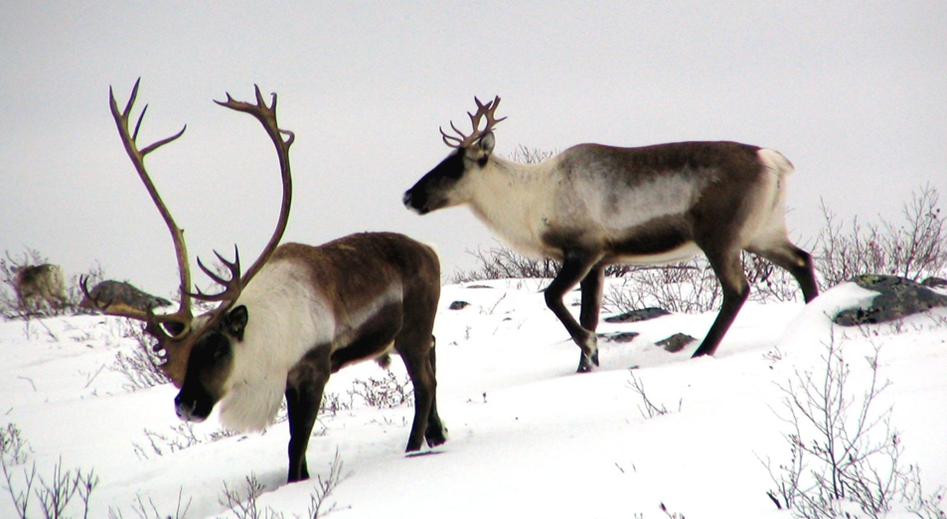
POLAR webinar series
In March 2022 POLAR held a series of six webinars in which researchers and Indigenous knowledge holders shared information on some of the environmental issues that northern communities are most concerned about—including caribou abundance, arctic char populations, whales and marine ecosystem biodiversity, climate change research, and changes in snow, ice, and precipitation.
Knowledge Sharing Webinar Series - YouTube
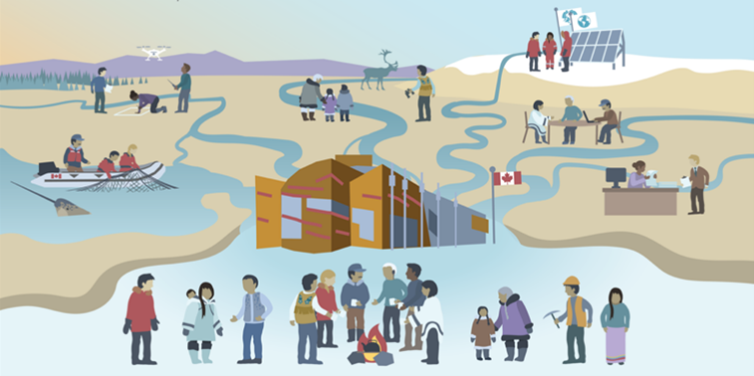
POLAR Speaker series in Cambridge Bay
POLAR held a weekly speaker series at CHARS featuring visiting scientists, local experts participating in research, and POLAR staff. Speakers shared their knowledge with the public, highlighting how they collaborate with the community and incorporate Inuit knowledge in their research.
Learn more about the Speaker Series.
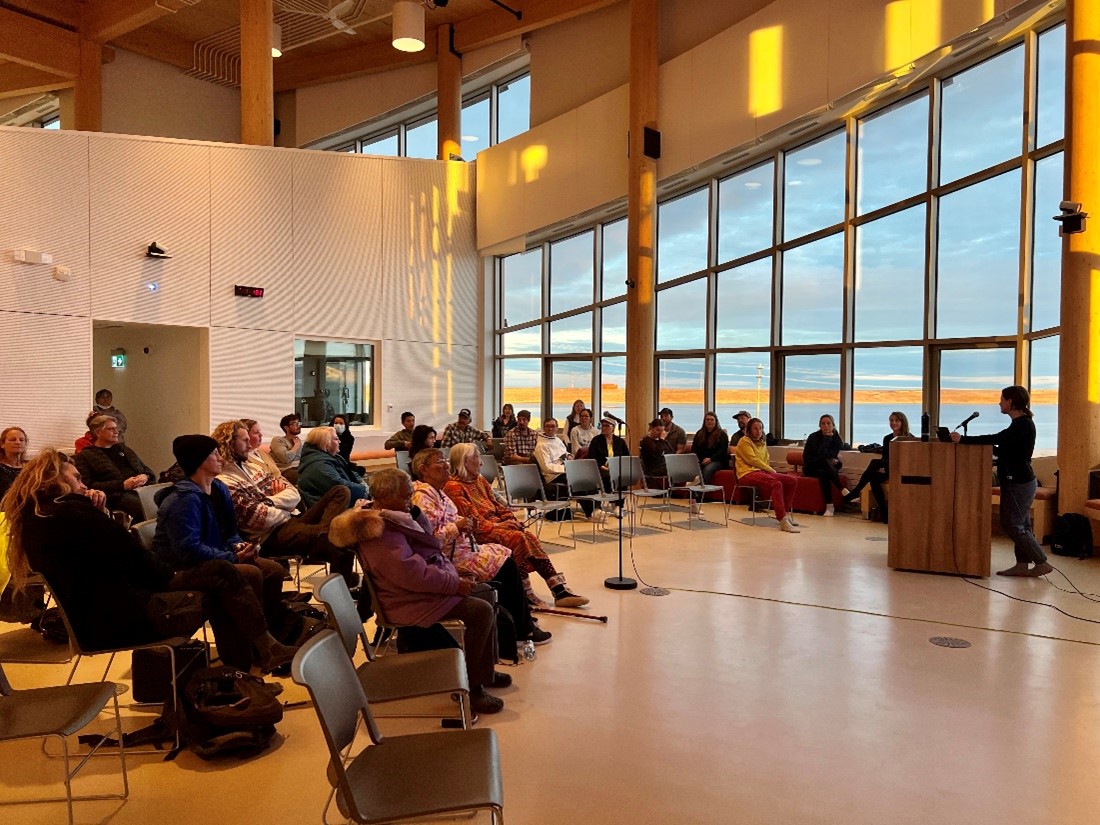
Amanda Savoie speaking to a group from the community at CHARS.
"What's in the water?" youth biodiversity workshop
In July POLAR research assistant and PhD student Danielle Nowosad held two workshops on freshwater biodiversity for Cambridge Bay youth in collaboration with the Kitikmeot Friendship Society. The enthusiastic young workshop participants visited a pond near CHARS to collect invertebrates. Then they went inside the station to examine the tiny creatures through a microscope and learn about their lives, habitats, and the important role they play in the ecosystem. Events like this feed children's natural curiosity about wildlife and can spark a lifelong interest—or even a career—in science.
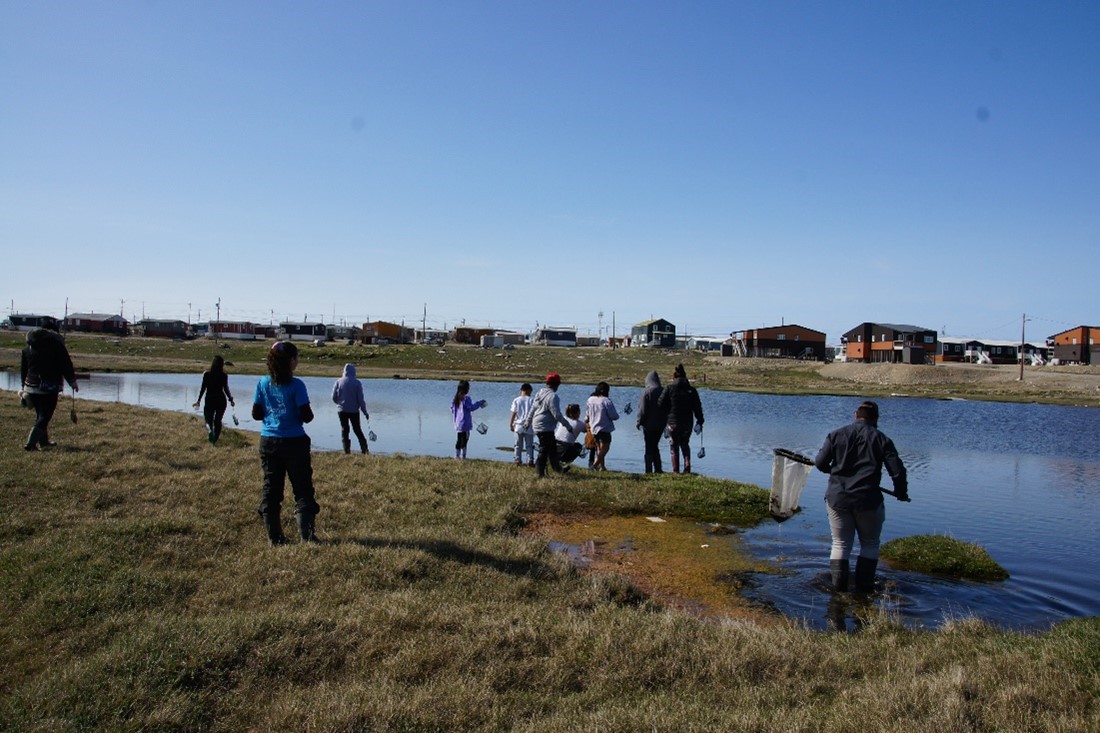
Avian influenza awareness
Northerners were concerned when avian influenza appeared this year in Canada. The disease can affect the ducks and geese that are part of the diet in Arctic communities. Through posters, social media, and an appearance on the CBC North radio show "Qulliq" by staff research veterinarian Matilde Tomaselli, POLAR alerted the public to the disease and how to recognize it and explained safe procedures for hunting and consuming birds and eggs.
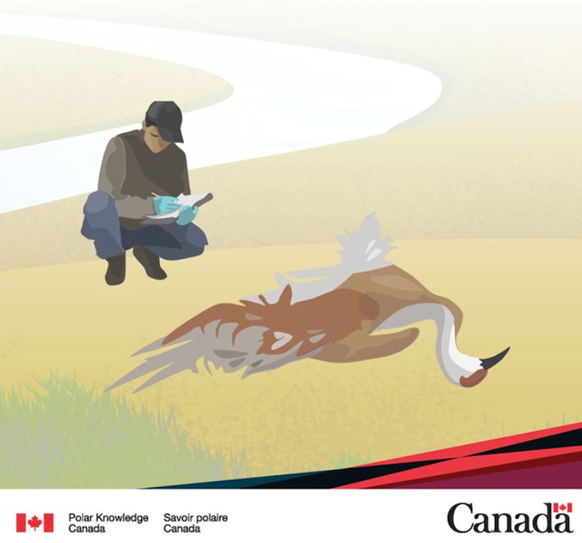
Clean energy for northern communities
Northern communities have prioritized a move away from a dependence on fossil fuels. POLAR is working with partners, like the National Research Council and Natural Resources Canada, on many clean energy projects. POLAR's clean energy team is developing and testing clean technologies to see how they handle the environmental, logistical and cultural challenges of Canada's remote northern communities.
- Testing and demonstrating a small wind turbine in the Arctic
- Producing biofuels from food waste in an Arctic community
- ARENA: Developing energy champions for remote communities
- BeAST: Producing energy from human waste
- Other projects
The 2022 Youth Science Career Awareness Camp
The 2022 Youth Science Career Awareness Camp was hosted at CHARS and introduced young people to opportunities in science. There were hands-on interactive sessions on wildlife research, robotics, transportation design, software coding, and monitoring of water quality and its impact on arctic marine life.
The Camp was supported primarily through the Makigiaqta Inuit Training Corporation, and sector partners include the Nunavut Wildlife and Management Board, MakerSpace, SHAD Canada, and the Recreation and Parks Association of Nunavut.

Annual General Meeting of the Kitikmeot Inuit Association
POLAR attended the Annual General Meeting of the Kitikmeot Inuit Association and provided an update on this year's work, including our progress on Inuit Employment and partnerships with Inuit organizations, agencies, and government.
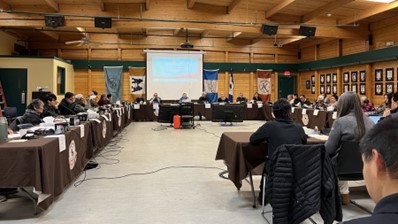
Visits to CHARS
Visit from Minister Dan Vandal
POLAR welcomed Minister Dan Vandal to CHARS on August 9. After a qulliq-lighting ceremony by Eva Kakolak Otokiak and throat singing by Victoria and Kalinda Koblogina, Minister Vandal toured the research station and spoke with researchers and other POLAR staff.
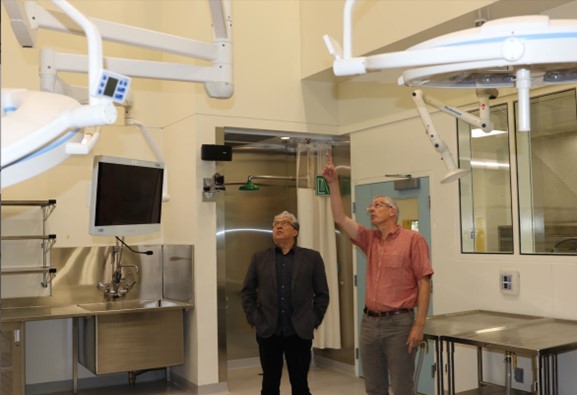
Visit from Prime Minister Justin Trudeau and the NATO Secretary General
On August 25th, the Right Honorable Justin Trudeau and Jens Stoltenberg, NATO's Secretary General visited CHARS. As part of their visit, they met with local elders and Inuit leaders and spoke with many of our researchers and staff who had the opportunity to share their work. The Prime Minister also met members of the Joint Task Force NANOOK-NUNAKPUT—soldiers, sailors, and aviators—who were stationed at CHARS this summer.
That day, we also had the pleasure of hosting the Honourable Pamela Hakongaq Gross, the Deputy Premier of Nunavut; the Honourable Dan Vandal, Minister of Northern Affairs; the Honourable Mélanie Joly, Minister of Foreign Affairs; the Honourable Anita Anand, Minister of National Defence; and General Wayne Eyre, Chief of the Defence Staff.

The Right Honourable Justin Trudeau, Jens Stoltenberg, The Honourable Dan Vandal, the Honourable Pamela Hakongaq Gross, the Honourable Mélanie Joly, the Honourable Anita Anand, General Wayne Eyre, Jennifer C. Hubbard, and Dr. David Hik.
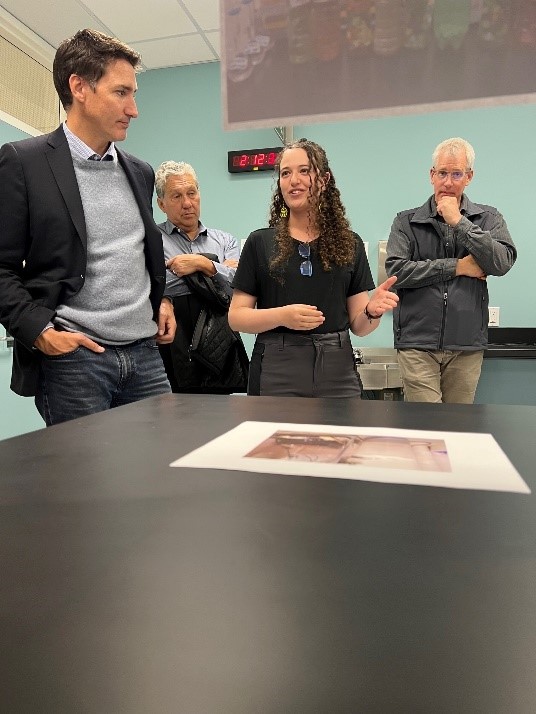
Rachel Mandel explaining the clean energy project to Prime Minister Justin Trudeau with David Hik and Minister Dan Vandal in the background.
While the Joint Task Force NANOOK-NUNAKPUT was at CHARS, POLAR also hosted an afternoon of fun for the community in Cambridge Bay with obstacle courses, a display of equipment, and an opportunity to meet members of the Canadian Armed Forces.
We also had the pleasure of hosting:
Senate Standing Committee on National Security and Defence
The Senate Standing Committee on National Security and Defence visited CHARS in October while in the Arctic continuing their study on "Issues relating to security and defence in the Arctic, including Canada's military infrastructure and security capabilities."
While at CHARS, they met with Jennifer C. Hubbard, POLAR's President and CEO, and Dr. David Hik, Chief Scientist and Executive Director of Programs, to learn about the issues and perspectives on defence and security in the Arctic.
International events and the Antarctic
Antarctic Treaty Consultative Meeting
On behalf of Canada, Global Affairs Canada (GAC) submitted an application to become a full Consultative Party to the Antarctic Treaty. In May, POLAR was part of the Canadian delegation, led by GAC and Environment and Climate Change Canada, supporting this effort at the Antarctic Treaty Consultative Meeting (ATCM-44). Although Canada's application received strong support from 27 of 29 countries, a consensus decision was not reached because of issues raised by two countries. The Consultative Parties agreed to defer a decision on Canada's application until the 2023 ATCM.
Canadians have made important contributions to Antarctic research for more than a century. Environmental conditions in the Antarctic influence global ocean and climate systems, and international collaboration plays an invaluable role in understanding and safeguarding the intrinsic value of the Earth's polar regions.

Council of Managers of National Antarctic Programs
POLAR presented Canada's application to become a full member of the Council of Managers of National Antarctic Programs (COMNAP) at the Annual General Meeting in July 2022. COMNAP representatives from 32 countries recognised the internationally collaborative, long-running, Arctic and Antarctic research programs being facilitated through Polar Knowledge Canada, including the facilities at the Canadian High Arctic Research Station (CHARS). Other countries noted the numerous collaborations already in place with Canadian researchers and the possibilities of leveraging those collaborations through COMNAP.
Arctic Circle Assembly
POLAR's Jennifer C. Hubbard (President and CEO) and David Hik (Chief Scientist, Executive Director of Programs) were part of the Canadian delegation at the annual Arctic Circle Assembly, in Reykjavik, Iceland. This year, over 2,000 people attended, including Her Excellency the Right Honourable Mary May Simon, Governor General of Canada.
Both Jennifer C. Hubbard and Dr. Hik presented during several sessions, including Research Collaboration between Canada –Inuit Nunangat—United Kingdom, Meaningful Engagement in Policy, Development and Research in the Arctic, and Funding International Arctic Science.
They also met bilaterally with international partners, namely the Swiss Polar Institute and Research Council of Norway, the Canadian Ambassador to Iceland (former POLAR staff Jeannette Menzies), and several northern and Indigenous leaders, including Grand Chief Ken Kyikavichik, Gwich'in Tribal Council; Lisa Qiluqqi Koperqualuk, ICC-Canada President; and Chief Bill Erasmus, Arctic Athabascan Council. See 2022 Arctic Circle Assembly.
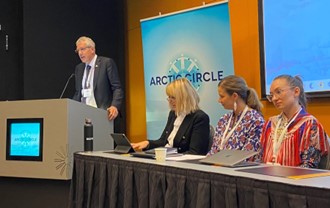

British Antarctic Survey
Huw Griffiths and Steve Roberts, researchers from the British Antarctic Survey (BAS) and Cath Waller, of the University of Hull, spent two weeks at CHARS this summer studying the biodiversity of rocky intertidal communities and macro and micro-plastics in Cambridge Bay. They sampled for microplastic pollution in the air, dust, beach sediments, animals, and water. They contributed to a larger survey of plastics in circumpolar environments and are hoping that their results will help inform attitudes and policies related to recycling and safe disposal of these long-term pollutants. Learn more about their adventures.

Polar Knowledge Canada
For media inquiries, contact:
communications@polar-polaire.gc.ca